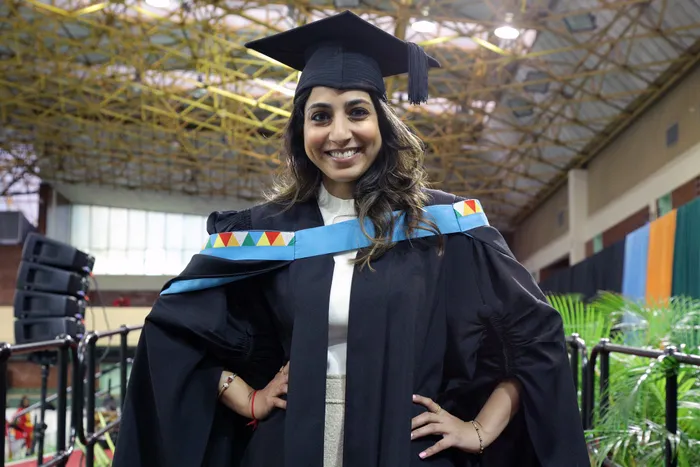Thesis examines domestic violence in South African Indian community

Shirdika Pillai graduated with her masters in arts degree from UKZN. Her research project brought to light the issue of domestic abuse in the South African Indian community.
A Durban Master’s degree graduate has brought to light in her dissertation a topic which has historically been swept under the carpet.
Shirdika Pillai graduated from the University of KwaZulu-Natal (UKZN) in May. In her dissertation, Ms Pillai uses play analyses to make interpretive assessments on how domestic abuse is experienced in the South African Indian community.
Ms Pillai, who is from Durban but now lives in Johannesburg, works as a communications associate for the Global Strategic Communications Council. She has been in the broadcasting industry for over a decade having worked at eNCA and the SABC. She matriculated at Durban Girls’ High School and holds a Masters of Arts degree in drama and performance studies.
Ms Pillai said she wanted to confront and challenge the social ills of domestic abuse as it remains tightly contained within the boundaries of the South African Indian community.
“In my experience domestic violence in the Indian community has been a taboo subject – it’s not broached, discussed or challenged,” said Ms Pillai. “Domestic abuse is one of those issues - we are aware it’s happening, but no one says anything. I think it’s a multi-layered complex issue but help is available through emotional and psychological support. However, the first step is acknowledging the problem. I think many victims accept the abuse as their lot in life however it’s neither normal nor natural in a healthy relationship.”
Ms Pillai’s research found that South African Indian women have largely been confined to the private domain of the home and are tasked with the role of gatekeeping culture, tradition and language.
This responsibility led to them being shackled by this role of cultural policing. This, coupled with young girls being taught their roles are subservient to males in the home - regardless of whether he is her father, brother or husband – has seen an enabling of patriarchal practices being perpetuated. In homes where domestic abuse takes place, women have little to no agency to confront the man in the home and challenge his authority, she said.
“Domestic abuse is a social ill that’s not restricted to a particular community, gender, race or class. I believe there are many men who fall victim to abusive situations; however, due to the dominance of patriarchy, women face higher instances of abusive circumstances,” said Ms Pillai.
She used local plays written by South African male playwrights to engage issues of domestic abuse. Their plays are honest about how ugly abuse can get at the hands of a male abuser. She said they were all motivated by real-life scenarios and took inspiration from the narratives they heard from women in similar situations.
“The narratives of these playwrights are powerful because we are best suited to tell our stories. By exposing the nature of domestic abuse on stage, the plays encourage audiences to challenge the entrenched structures of patriarchy which allow the violence to continue unabated,” she said.
“The plays I chose are: Ismail Mahomed’s Purdah (1993), Robin Singh’s Till Death do us Part (1993) and Vivian Moodley’s A Cookie in the Kitchen (2002). These three texts put the experiences of victimised women in the public arena of the stage, an action that is historically foreign to Indian South African theatre. In doing so, they disturb the engrained power structure in the Indian South African community.”
Ms Pillai believes it’s possible to use the medium of theatre to challenge the silence around domestic abuse. Through each of the plays she analysed - audience are forced to ask uncomfortable questions about the power dynamics at play between men and women, husbands and wives. The plays challenge communal notions of patriarchy by highlighting how patriarchal attitudes reinforce the silence around domestic abuse.
“The theatre experience is not an impenetrable box; it’s an artificial construction -it’s malleable. It can be changed, reconstructed and reconfigured to reflect, in this instance, changing attitudes around engrained patriarchal structures. However, for attitude to be reflected, change must be initiated by audience members who themselves reflect society. Through the depictions of engrained power imbalances on stage, audiences should question the structures that keep social ills in operation. In confronting the silences, questions can begin to be asked about patriarchal structures in the hope the questioning will lead to the unravelling of these entrenched power systems,” she said.